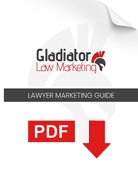

Marketing Guide: Rural Lawyers
Website Design for Rural Lawyers
Learn what it takes to design an effective website for your Rural Law Firm.
Introduction
A robust online presence is a necessity for any business, and law firms in small towns or rural areas are no exception. A well-designed website serves as a powerful tool for rural lawyers to showcase their expertise, reach out to potential clients, and establish credibility.
In an industry where trust and professionalism are critical, a sleek, user-friendly website can make a significant difference. It serves as the first point of contact between you and your potential clients, thereby shaping their initial perceptions about your law firm. A well-crafted website can convincingly convey your firm’s values, ethos, and commitment to client service.
II. The Importance of a Well-Designed Website for Small-Town Lawyers
Think of your website as your virtual front office. Just as you would want your physical office space to be welcoming, organized, and reflective of your professional image, your website should embody these qualities too. It is the digital manifestation of your law practice and often serves as the first impression for potential clients.
Your online presence extends beyond just your website. It encompasses your visibility on search engines, your reputation on review sites, your engagement on social media platforms, and your listings in online directories. However, your website remains the central hub of all your online activities.
The design of your website should not only be aesthetically pleasing but also functional and easy to navigate. It must provide visitors with the information they seek in a straightforward manner. This includes details about your practice areas, your team’s qualifications, case studies or testimonials, and clear instructions on how to contact you.
Overview of This Guide
This comprehensive guide will delve into the key aspects of website design for rural lawyers. We’ll discuss the critical elements that make a law firm website effective, including its layout, content, SEO strategy, accessibility, and security measures. We’ll also touch on how to optimize your website for mobile users, a factor that is increasingly important in today’s smartphone-dominated world.
We’ll provide practical advice on each of these areas, with the goal of helping you create a website that not only looks professional but also helps you achieve your business objectives. Whether you’re building a new website from scratch or looking to improve an existing one, this guide will equip you with the knowledge and strategies you need to make your online presence stand out.
In the following sections, we’ll start by discussing the key considerations in planning your website design, followed by a detailed look at the different elements of an effective law firm website. We’ll then delve into the technical aspects, such as SEO and mobile optimization, before wrapping up with some tips on maintaining and updating your website.
III. The Importance of Website Design
A well-designed website is more than just an online business card for rural lawyers; it’s a tool that can significantly enhance their professional image, extend their reach beyond geographical limitations, provide 24/7 availability, and serve as a cost-effective marketing platform.
Professionalism and Credibility
First Impressions Matter:
A website often serves as the first point of contact between a lawyer and potential clients. An outdated or poorly designed website can create a negative first impression, potentially driving away prospective clients. On the other hand, a modern, visually appealing website can instantly boost your credibility and make visitors more likely to engage with your content and services.
Visual Appeal and Professionalism:
The aesthetic aspect of your website plays a crucial role in conveying your law firm’s professionalism. Elements like color scheme, typography, and imagery should be carefully chosen to reflect your brand identity and values.
Easy Navigation for a Positive User Experience:
A user-friendly website design, characterized by intuitive navigation and logically organized content, can enhance the visitor’s experience, making them more likely to return or recommend your services.
Showcasing Expertise without Legal Jargon:
Your website should clearly communicate your expertise and services in a language that non-lawyers can understand. Avoid excessive legal jargon and focus on how you can help solve your clients’ issues.
Extended Reach
Unique Challenges for Rural Lawyers:
Practicing law in a rural area presents unique challenges, such as a smaller client base and fewer networking opportunities. A well-designed website can help mitigate these challenges.
Overcoming Geographical Limitations:
A strong online presence can help rural lawyers reach potential clients who may not be in their immediate geographical vicinity but are willing to seek their services.
Showcasing Expertise to a Broader Audience:
Through blogs, case studies, and other informative content, you can showcase your expertise to a broader audience, attracting potential clients from beyond your local area.
Bridge the Distance:
A website allows potential clients to learn about your services, schedule consultations, and even conduct meetings virtually, thereby breaking down distance barriers.
24/7 Availability
Importance of Accessibility:
Unlike a physical office, your website is accessible 24/7. This allows potential clients to access information about your services at their convenience.
Providing Information Outside Business Hours:
With detailed service descriptions, FAQs, and resource sections, your website can provide valuable information to potential clients even outside business hours.
Facilitating Client Communication at Any Time:
Features like contact forms, live chat, and booking systems enable potential clients to initiate communication or schedule appointments at any time that suits them.
Cost-Effective Marketing
Cheaper than Traditional Marketing:
Compared to traditional marketing methods like print ads, a website can reach a larger audience at a fraction of the cost. It’s also easier to measure and improve its effectiveness.
SEO for Organic Traffic in Rural Areas:
By optimizing your website for local search terms, you can attract more organic traffic from people looking for legal services in your area.
Continuous Website Performance Tracking and Improvement:
Tools like Google Analytics can provide insights into your website’s performance, helping you make data-driven improvements.
Content Marketing as a Credibility-Building Tool:
Regularly publishing informative content on your website not only improves your SEO but also establishes you as an authority in your field, thus enhancing your credibility.
IV. Essential Elements and Best Practices for Website Design
Designing a website for rural lawyers requires careful consideration of various elements to ensure it serves as an effective marketing tool and meets the needs of potential clients. Here are the key components and best practices for website design:
Clear and Intuitive Navigation
Menu Structure and Organization:
The menu should be logically structured, making it easy for visitors to navigate your site and find the information they need. This might include sections for your services, about us, blog, and contact information.
Search Functionality:
A search feature can significantly enhance user experience by allowing visitors to find specific information quickly and easily.
Responsive Design:
Your website should be designed to work seamlessly on all devices, including desktops, tablets, and mobile phones. This ensures that visitors have a positive experience regardless of the device they use.
Responsive Design
Significance of Mobile Optimization:
With more people accessing websites on their mobile devices, having a mobile-optimized website is crucial. It ensures that your site looks good and functions well on smaller screens.
Benefits for SEO and User Experience:
Mobile optimization not only improves user experience but also boosts your SEO. Google’s mobile-first indexing means that the mobile version of your website is considered the primary version for ranking purposes.
Improved Usability and Accessibility:
A responsive design enhances usability by making it easier for visitors to read content, click links, and fill out forms on their mobile devices.
Highlight Your Expertise
Detailed Qualifications and Licenses:
Display your qualifications, licenses, and any specializations clearly on your website to showcase your expertise and credibility.
Success Stories and Case Studies:
Sharing success stories or case studies provides tangible proof of your skills and can help potential clients understand how you can assist with their legal issues.
Client Testimonials:
Positive testimonials from past clients can significantly enhance your credibility and build trust with potential clients.
Engaging Content
Importance of Plain Language:
Legal matters can be complex, so it’s important to use plain language that your audience can easily understand.
Organizing Content Effectively:
Break up your content into sections with clear headings to make it easier to read and digest.
Regular Updates and Content Relevance:
Regularly update your website with new content to keep it relevant and improve your SEO.
Providing Valuable Insights:
Share insights and advice through blog posts or articles to establish your authority in the field and build trust with your audience.
Search Engine Optimization (SEO)
Conducting Keyword Research:
Use tools like Google Keyword Planner to identify keywords related to rural legal services that your potential clients are searching for.
Incorporating Keywords:
Include these keywords in your website content, meta descriptions, and title tags to improve your visibility in search engine results.
Regularly Publishing Blog Posts:
Regularly publishing informative blog posts can help you rank for more keywords, driving organic traffic to your site.
Building Quality Backlinks:
Backlinks from reputable websites can boost your website’s authority and improve its ranking in search engine results.
Ongoing Monitoring:
Use tools like Google Analytics to monitor your website’s performance and adjust your SEO strategy as needed.
Page Speed
Significance of a Fast-Loading Website:
A slow-loading website can frustrate visitors and lead to high bounce rates. Ensure your website loads quickly to provide a positive user experience.
Tips for Optimizing Loading Speed:
Use compressed images, limit the use of heavy scripts, and leverage browser caching to improve your website’s loading speed.
Tools for Testing and Improving Loading Speed:
Use tools like Google PageSpeed Insights to test your website’s loading speed and get recommendations for improvement.
Contact Information and Call-to-Action
Importance of Clear Contact Information:
Display your contact information prominently on your website to make it easy for potential clients to get in touch with you.
Implementing Effective Call-to-Action:
Use clear and compelling calls-to-action to guide visitors towards desired actions, such as scheduling a consultation or downloading a resource.
Web Forms:
Provide web forms for visitors to fill out if they want more information, making it easy for them to initiate contact.
Secure and Trustworthy
SSL Certification:
An SSL certificate encrypts data transferred between the user’s browser and your website, enhancing security and building trust with your visitors.
Displaying Trust Badges:
Display badges from reputable organizations or certifications to enhance credibility and reassure visitors that your website is trustworthy.
Additional Security Measures:
Implement additional security measures, such as two-factor authentication and regular website backups, to protect your website and client information.
V. Navigating Ethical Considerations in Online Legal Marketing
Online legal marketing, while offering a myriad of opportunities for law firms to reach a broader audience, presents its own set of ethical considerations. The digital landscape, with its constant flux and the advent of new technologies, can blur the lines of what is considered ethical and legal. It’s essential to understand these considerations and navigate them adeptly to maintain the integrity of your profession and firm.
Ethical Guidelines for Content Creation
Content creation is a fundamental aspect of online legal marketing. However, creating content ethically requires a balance between promoting your services and adhering to the professional code of conduct.
Firstly, accuracy is paramount. The American Bar Association (ABA) Model Rules of Professional Conduct Rule 7.1 prohibits lawyers from making false or misleading communication about their services. This includes statements that can create unjustified expectations or unsubstantiated comparisons to other lawyers’ services. Therefore, every piece of content you publish should be fact-checked and accurate.
Secondly, confidentiality must be maintained. Even when sharing success stories or case studies, it’s necessary to anonymize the information or obtain explicit consent from clients to avoid breaching attorney-client privilege.
Lastly, your content should not constitute legal advice. Providing specific advice without understanding the entirety of a person’s situation can lead to misinterpretation and potential legal issues.
Ethical Use of Client Testimonials
Client testimonials are powerful tools for building trust and showcasing expertise. Yet, they too must be handled with care.
The ABA Model Rule 7.1 comes into play here as well. Any testimonial or endorsement must not be false or misleading. It’s crucial to ensure that testimonials reflect the true experience of clients and are not exaggerated or fabricated.
Moreover, the ABA Model Rule 1.6 obliges lawyers to maintain client confidentiality. Therefore, before using a testimonial, written consent from the client is necessary. This consent should specify what information can be shared and in what context.
Compliance with Legal Advertising Rules
Legal advertising, like any other form of advertising, is governed by rules and regulations. In the U.S., these rules are set by the ABA as well as state bar associations.
The ABA Model Rules 7.2 and 7.3 regulate advertising and solicitation. Lawyers are prohibited from giving anything of value to someone for recommending their services, except for the reasonable costs of advertisements or communications. Direct solicitation of potential clients is also restricted unless the person is a lawyer or has a family, close personal, or prior professional relationship with the lawyer.
State bars may have additional rules. For instance, some states require legal advertisements to be labeled as such, or they may prohibit certain types of ads. Therefore, it’s essential to familiarize yourself with both national and state-specific rules.
Navigating ethical considerations in online legal marketing can be complex, but it’s essential for maintaining professionalism and credibility. By adhering to guidelines for content creation, using client testimonials ethically, and ensuring compliance with legal advertising rules, law firms can uphold the highest standards of the legal profession while effectively reaching their target audience.
VI. Exploring Emerging Trends in Law Firm Website Design
The digital landscape is dynamic and constantly evolving. To stay competitive, it’s crucial for law firms to keep abreast of the latest trends in website design. Here are some of the emerging trends that are shaping the future of law firm websites.
Chatbots for Instant Client Interaction
Chatbots are becoming increasingly prevalent on law firm websites. A chatbot is an artificial intelligence (AI) software that can simulate a conversation (or a chat) with a user in natural language. They offer instant client interaction, answering queries, and providing information 24/7.
Chatbots can handle routine inquiries, allowing firms to focus on more complex client interactions. By offering immediate responses, they improve client satisfaction and engagement. However, it’s important to ensure that chatbots are programmed in a way that respects client confidentiality and does not provide specific legal advice, which could raise ethical issues.
Personalized User Experiences
Another significant trend is the move towards personalized user experiences. This involves tailoring website content and navigation based on the user’s behavior, preferences, or location. For example, a law firm might display different content to a first-time visitor than to a repeat visitor.
Personalization can improve user engagement and conversion rates. However, it must be done ethically and transparently, with respect for user privacy and data protection regulations.
Integration of Augmented Reality
While still in its early stages in the legal sector, augmented reality (AR) offers exciting possibilities for law firm websites. AR can enhance the user experience by offering virtual law office tours, interactive case studies, or visual explanations of legal concepts.
However, this technology should be used judiciously, as it may not be appropriate or beneficial for all types of legal services.
VII. The Role of Social Media in Legal Marketing
While the website remains the central hub of a law firm’s online presence, social media is an integral part of the digital marketing mix. Here are some strategies for leveraging social media effectively.
Content Creation
Creating high-quality, engaging content is key to success on social media. This could include blog posts, videos, infographics, or podcasts that provide value to your audience and showcase your expertise.
Remember, content should not be overly promotional but should aim to inform, educate, or entertain. As with website content, social media content must be accurate, ethical, and respectful of client confidentiality.
Community Engagement
Social media offers opportunities for direct interaction with your audience. This could involve responding to comments, participating in discussions, or sharing relevant content from others. Building a community around your brand can enhance your reputation and client loyalty.
Again, it’s crucial to interact professionally and ethically, avoiding any behavior that could harm your reputation or violate professional conduct rules.
Targeted Advertising
Social media platforms offer powerful tools for targeted advertising, allowing you to reach specific demographics based on factors like age, location, interests, or behavior. This can increase the efficiency and effectiveness of your marketing efforts.
However, lawyers must ensure that their advertising complies with ethical rules and regulations, including those regarding misleading or deceptive practices, confidentiality, and solicitation.
By staying abreast of emerging trends and leveraging these platforms effectively, law firms can enhance their online presence, reach a wider audience, and build stronger client relationships.
VIII. Conclusion
A well-designed website is a powerful tool for rural lawyers, enhancing their professionalism, extending their reach beyond geographical boundaries, providing 24/7 availability, and serving as a cost-effective marketing platform. The design of a law firm’s website can significantly influence potential clients’ perceptions and decisions, making it a critical component of a lawyer’s professional image and success.
A well-structured menu, responsive design, engaging content, and effective search engine optimization are among the key elements that contribute to a successful website. By highlighting their expertise through detailed qualifications, case studies, and client testimonials, rural lawyers can build trust with potential clients and establish themselves as authorities in their field.
Moreover, by ensuring fast loading speed, displaying clear contact information, and implementing robust security measures, they can provide a positive user experience and further enhance their credibility.
Uncover some great ideas for marketing your Rural Law Firm.
Need help with website design for your law firm? Contact the Gladiator Law Marketing team. For over 10 years we have been helping rural law firms grow with actionable, data-driven marketing strategies. Our track record speaks for itself, with a remarkable 95% client retention rate. From award-winning websites to high-ROI SEO, PPC and Social Media campaigns, Gladiator Law Marketing can help your law firm stand out in a crowded marketplace. Contact us at 888-683-3212.




